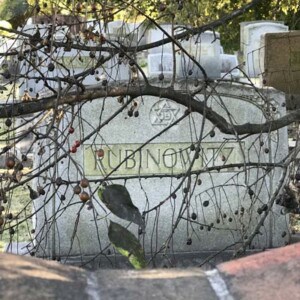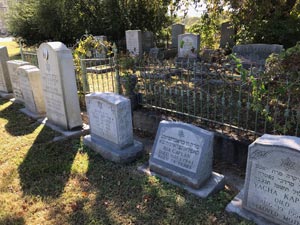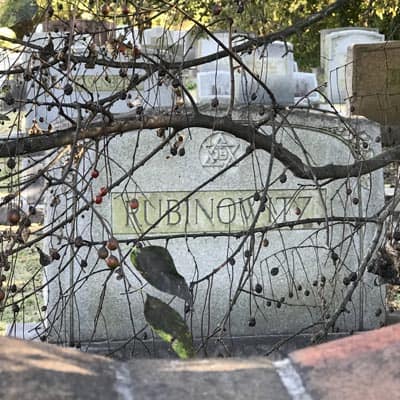
Workmen’s Circle Cemetery in Chesapeake.
After the Revolutionary War, numerous Jewish families moved to Tidewater to take advantage of the tremendous economic opportunities and central location that made this region so attractive. The
emergence of these Jewish communities resulted in a variety of congregations and cemeteries.
The Torah teaches that when a Jewish community is established, two significant elements are needed. There must be a mikveh, a ritual bath or river to achieve and maintain purity, and a cemetery where the dead can be honored and respectfully buried.
Land where the cemetery is located is considered holy ground and a special consecration ceremony takes place upon its inauguration. According to Jewish tradition, Jewish burial sites are sacred and
must remain undisturbed in perpetuity. The connection between the soul and the human body after death is an essential part of the Jewish belief in the eternity of the soul.

Gomley Chesed Cemetery in Portsmouth.
Ideally and traditionally, congregants are responsible for taking care of their cemeteries. Yet through the passage of time, members pass away, congregations merge, and people pick up and move. Sometimes they experience economic issues, and sometimes they are forced out. Once the community is gone, no one is left to respect the dead and tend to the cemetery.
Art Sandler and his wife Annie observed this first hand when traveling through Eastern Europe 20 years ago. Many of the Jewish cemeteries that dotted the countryside were abandoned, had fallen into disarray, were overgrown with weeds, and in some instances, completely destroyed. This desecration greatly impacted Sandler, and when he returned home, he requested that the United Jewish Federation of Tidewater establish funding for the sole purpose of preserving Jewish cemeteries in Tidewater.
Fast forward to 2018. Under the watchful eye of Glenn Saucier, facility director of the Reba and Sam Sandler Family Campus, and the hard work of his crew, numerous Jewish cemeteries maintained
by the Federation are beautifully landscaped and well taken care of.
“Glenn has done a wonderful job cleaning up the cemeteries, and has received countless letters from people thanking him for his dedication, hard work, and attention to detail,” says Sandler.
B’nai Israel Cemetery is the most recent recipient of UJFT’s Cemetery Fund. The cemetery is 114 years old, and contains more than 1,100 graves of individuals who comprise a significant portion of local Jewish history.
Earlier this year, Sandler and Saucier spoke with Jeffrey Brooke, president of B’nai Israel congregation, about significant maintenance challenges at the cemetery. Most of the work needed was
to repair the results of vandalism and subsidence—the gradual caving in or sinking of the ground. Several stones had been removed, were broken or fallen, and the property was overgrown. As the result of a conversation between the three, the Federation made an $18,000 contribution to B’nai Israel for the repairs and to add security cameras.
Lt. Commander Adam Goldberg, chairman of the B’nai Israel Cemetery committee, currently spearheads the cleanup efforts and works with a dedicated group of volunteers to facilitate this project.
Goldberg says that congregants have been volunteering from 10 am to noon on Sundays to assist with the maintenance effort and will continue to do so as long as the weather holds. “We’ll probably be taking a hiatus during winter and start back in the spring. The work has been predominantly headstone repair, but has also included gardening and foliage removal.”
To date, 73 headstones have been lifted and repaired. Thirty-nine were repaired by the contractors and 34 repaired by volunteers.
Goldberg’s service in the United States Navy takes him to many locations, and he is deeply interested in the histories of the places where he and his family are stationed. “What better place to put history
in perspective then the local cemetery?” he asks.
The B’nai Israel Cemetery is especially intriguing, says Goldberg, because many of the internees are connected to friends of his who still live in the community.
Son Zev-Adi Goldberg, is assisting with the cemetery cleanup project “because it is a great mitzvah to help out people. I like working with the lifting equipment and seeing stuff get done.”
“Keeping our cemeteries in good condition for future generations is a special mission,” says Saucier. “Please consider making a donation to the UJFT Cemetery Fund.”
The UJFT manages the Gomley Chesed/Chevra T’helim cemeteries in Portsmouth and the Mikro Kodesh Cemetery (also known as the Berkley Cemetery) and Workman’s Circle Cemetery in Chesapeake. Management duties include maintenance and monument installation supervision, planning and executing restoration projects, record and archive preservation, regular inspections,
and choosing burial plots for the indigent.
Sandler says it is important “for our current community to continue to work together to preserve and protect our Jewish heritage. A beautiful and peaceful resting place honors those who have come before us and is a touchstone for those yet to come.”
Sharon Davis Freeman

